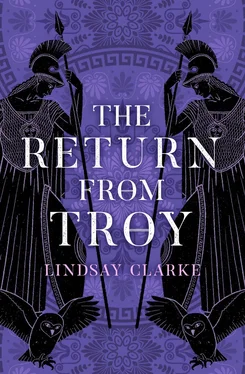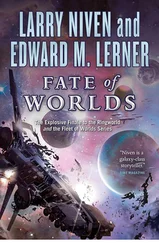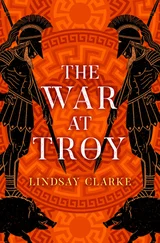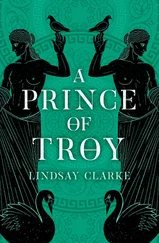1 ...6 7 8 10 11 12 ...18 One morning they woke to find a huge grey fish stranded on the beach. It had a fronded mouth and its ribbed body was much larger than that of any fish they had seen before. They strolled about it for a while, gazing into the sad jelly of its eye and listening to the remote, failing thunder of its heart. But none of them could work up sufficient energy either to kill the monster or refloat it; so the great fish was left gasping in the sunlight till it died. After a time, when its flesh began to stink, they merely moved their mats upwind into a sheltered place and waited for a higher wave than usual to reclaim the rotting carcass and draw it out to sea.
Around that time Odysseus discovered that the lotus was not always benign. There were deranging moments when he was revisited without warning by images that had been seared on his memory at the fall of Troy. The lotus allowed ample time to inspect the gaudy colours erupting from the fat belly of a Trojan citizen he had slaughtered. He found himself staring at the white, pulpy texture, stained with pink, that he had seen in the brains of a boy whose head someone had smashed against a garden wall. He could hear the sounds of screaming women almost as clearly as the cries of the fish-eagles dawdling in the sky; and there was a bald-headed man with jewels in his ears who kept begging him for mercy, over and over again, as he lay pissing himself with fear on the steps of King Priam’s palace.
At other times the shade of Hecuba was everywhere, barking and jeering, as she clutched the eyes of Polymnestor in her hands.
After one such visitation, Odysseus sat up groaning and beating his head with his fists, only to find Hanno looking down at him with mild concern. When the Libyan asked the cause of his distress, he tried to explain what had happened on the night that Troy fell and in the days that followed. His account was rambling and fragmentary, articulate only in its pain.
Hanno said, ‘So you blame yourself for all the destruction that was done at Troy?’
‘Who else can I blame?’ he growled. ‘It was me who thought up the means to get us inside the city. It was me who gave the false promises that persuaded Antenor to come over to our side.’
‘I know nothing of war,’ Hanno answered. ‘But from what you have said it seems you had no knowledge that the promises were false?’
Unwilling to accept such glib absolution, Odysseus said, ‘The truth is, I might still have given them even if I’d known how false they were. And perhaps I knew it all along – not consciously, but in my secret heart, you understand?’
Hanno nodded his dark head and sighed. ‘In any case, my friend, each of us must follow his fate. The gods gave you a quick mind and a plausible tongue. You have merely made use of them.’
‘But I can’t seem to think straight these days. And I find it hard to talk as well.’
‘Sometimes the lotus darkens our thoughts. It is the price we pay for the illumination it also brings.’
Odysseus turned away. ‘I’ll not blame my troubles on a fruit. Nor do I expect the gods to look kindly on the desolation I’ve caused.’
The two men sat together in silence for a while watching some members of Odysseus’ crew at a dice-game along the shore. Sighing Hanno said, ‘I remember discussing such matters once with a teacher out of India whom I encountered in Egyptian Thebes. He was a very old man and as wise as he was old. He told me that the secret of life is to float on its surface as the flower of the lotus floats on water, without sinking and without wetting its leaves. I believe the teaching to be sound.’
Dryly Odysseus said, ‘Was he ever present at the sacking of a city?’
‘That I do not know,’ Hanno conceded, ‘though I believe him to have been a man of peace.’
‘Then what could he know of a warrior’s suffering?’
‘As to that,’ Hanno smiled, ‘he told me the story of a warrior-prince among his people who came to a field of battle and was appalled to find kinsmen and friends armed against him on the opposing side. His mind was thrown in turmoil at the prospect of killing people whom he loved and admired; but in his confusion the hero was visited by a god whom he held sacred. The god told him that it was the warrior’s duty to devote himself to battle in a righteous cause, and that he should be strengthened by the knowledge that the soul outlives the body, and that those who fall in battle do so only to be refunded into the great cycle of life.’
Odysseus studied the darkly smiling eyes. ‘A very satisfactory story,’ he said, ‘if you believe your cause to be righteous and that we are permitted more than one sojourn on this sorry earth.’
‘But how can we know that we are not?’ Hanno asked mildly.
‘I’m certain only of the here and now,’ Odysseus answered. ‘Life may be very pleasant here among the Lotus Eaters, but I’ve seen enough to know it’s often wretched elsewhere. I too have had dealings with the gods in my time. As far as I can tell, we’re nothing but their playthings.’
Hanno nodded undismayed, and glanced across at where two of the dice-players were now caught up in a torpid quarrel. ‘You must allow the lotus more time,’ he smiled. ‘Come, my friend, take some wine.’
More weeks drifted by. Some desultory repair work was done on the ships; then the men relapsed into idleness again.
Late one afternoon, with a pang of self-disgust Odysseus disentangled himself from the sinuous black limbs of a woman whose name he could not pronounce. For the past half hour she had been employing the skills which had already won her many anklets to coax fresh life into his sluggish member; but suddenly he could abide her no more. He sat up, shook his head, and saw the oars of a warship flashing in the sunlight as the galley entered the quiet waters of the bay.
The captain of the ship turned out to be a Thessalian named Guneus whom Odysseus had vaguely known at Troy as a friend of Achilles and Patroclus. He splashed ashore from his beached vessel, exclaiming with surprise when he recognized Odysseus, burly and good-natured, the smile on his face cracked by the white ridge of a scar.
‘I’d heard rumours of a party of Argives camped in these parts,’ he said, ‘but I didn’t think to find you here. I’d given you up for dead, like everybody else. I should have guessed it would take more than a bad blow to finish off Odysseus. But there were so many ships lost in that storm, I assumed yours must have been among them.’
Enlivened by this reminder of a world that had almost receded over his horizon, Odysseus invited the man to come and eat with him. They sat down on the mats outside the lodge while a woman served them calabashes filled with lotus-meal. Explaining how he had been driven south by the storm as he tried to double Cape Malea, Odysseus caught the leathery face of Guneus frowning at the scene around him. As though looking through the newcomer’s eyes, Odysseus saw his men lying about their ramshackle lodges, lax, bleary and unkempt. Many of them were too far gone in their lotus dreams to take much interest in the new arrivals. Embarrassed by the sight, he was suddenly at a loss to explain how it was that they had remained here for so long.
‘We’ve been taking it easy here,’ he muttered. ‘After the long strain of the war, I mean … and one of the worst voyages I can recall.’ He took in his visitor’s polite but uncertain nod. ‘Anyway, what brings a Thessalian as far south as this?’ he added with forced good humour. ‘The last I heard you northerners had your hands full fighting some new invader. Is it all over? Have you driven them back to whatever nameless wastes they came from?’
Guneus frowned and drew in his breath. ‘The Dorians won’t be driven back. They’re too strong for that. There’s too many of them and some of them carry weapons superior to ours. Neoptolemus and the Myrmidons are holding the line by sheer bloody-minded grit and obstinacy. With luck they might retake Iolcus next year; but the lands to the north are gone for ever – my own estates among them. I got back from Troy to learn that my father and young sons had been killed in the Dorian advance, and my wife and daughters taken into slavery.’
Читать дальше












